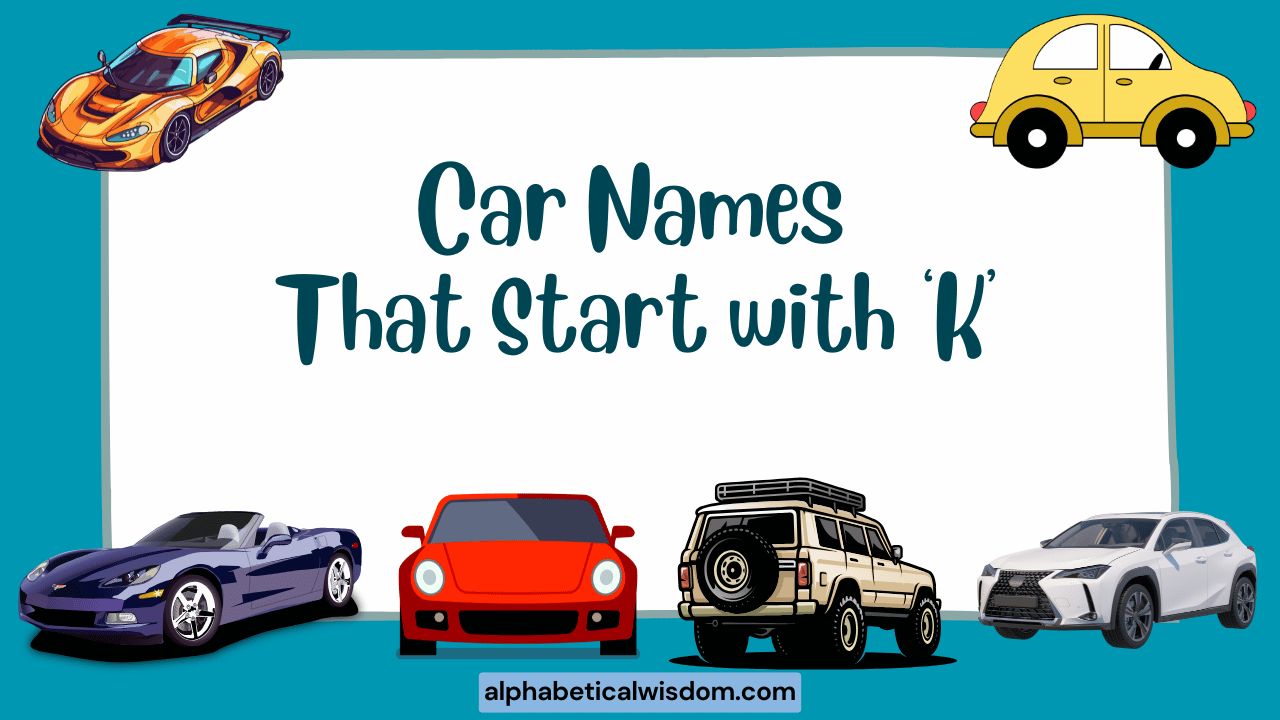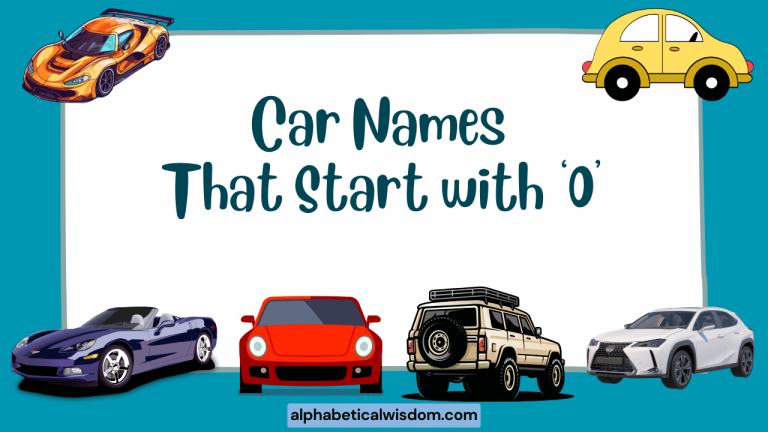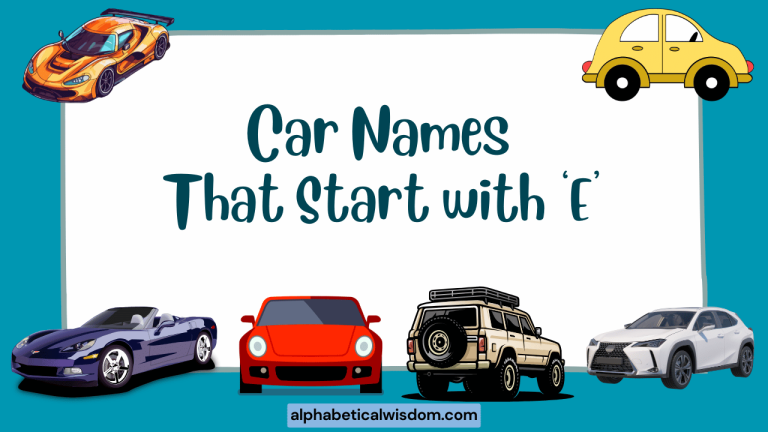Car Names Starting with K: A Comprehensive Grammar Guide
Understanding the grammar surrounding car names, particularly those starting with ‘K,’ might seem niche, but it highlights fundamental aspects of English: proper nouns, capitalization rules, and the nuances of brand names. This exploration is beneficial for English language learners, marketing students, and anyone interested in the intersection of language and branding.
Mastering these principles enhances overall language proficiency and attention to detail in writing and communication.
Table of Contents
- Introduction
- Definition: Car Names as Proper Nouns
- Structural Breakdown of Car Names
- Types and Categories of Car Names
- Examples of Car Names Starting with K
- Usage Rules for Car Names
- Common Mistakes When Using Car Names
- Practice Exercises
- Advanced Topics: Etymology and Connotation
- Frequently Asked Questions (FAQ)
- Conclusion
Definition: Car Names as Proper Nouns
Car names, like other brand names, function primarily as proper nouns. A proper noun is a specific name for a particular person, place, or thing. Unlike common nouns (e.g., car, truck, sedan), proper nouns are always capitalized in English, regardless of their position in a sentence. This capitalization distinguishes a specific car model (Kia Seltos) from a general category (an SUV).
The function of a car name is to identify and differentiate a specific model within a manufacturer’s product line. These names serve as trademarks, legally protected identifiers that distinguish one company’s products from those of its competitors.
They also play a crucial role in marketing and branding, often chosen to evoke specific qualities or associations.
Context is key when discussing car names. In formal writing, maintaining correct capitalization is essential. In casual conversation, the rules might be relaxed, but understanding the grammatical foundation remains important for clear and accurate communication. For example, saying “I saw a Kia” clearly refers to a specific brand, whereas “I saw a car” is a general statement.
Structural Breakdown of Car Names
Car names can be structurally simple or complex, consisting of single words, compound words, or phrases. Some names are derived from existing words, while others are entirely invented.
Understanding these structural elements helps in analyzing their grammatical properties.
Single-Word Names: These are the most straightforward, often using existing nouns or adjectives. Examples include Kia, Karma, and hypothetical examples like Kinetic or Knight, if used as car names.
Compound Names: These combine two or more words, sometimes hyphenated, to create a unique identifier. While less common with ‘K’ car names, consider hypothetical examples such as “King-Cruiser” or “K-Force”.
Phrasal Names: These consist of multiple words forming a phrase. While rare with ‘K’, they might include descriptive terms or aspirational phrases. Imagine “King of the Road” as a hypothetical example.
Alphanumeric Names: Many car manufacturers use alphanumeric designations (letters and numbers) to name their models. While less common with ‘K’ as the starting letter, imagine a hypothetical “K900” or “K7” designation.
The grammatical structure of a car name dictates how it interacts with other elements in a sentence. Proper capitalization remains constant, but the name’s role as a subject, object, or modifier will influence sentence construction. For instance, “Kia is a Korean automaker” uses the car name as the subject of the sentence.
Types and Categories of Car Names
Car names can be categorized based on their origin, meaning, and intended brand image. Here are a few common categories:
Descriptive Names
These names aim to convey specific attributes or features of the car. While not prevalent with ‘K’, imagine a hypothetical “Kinetic” suggesting energy and movement.
Evocative Names
These names seek to evoke certain emotions, associations, or lifestyles. “Karma,” for example, suggests a sense of destiny or spiritual connection.
Geographic Names
Some car names are derived from places, often chosen to associate the vehicle with a particular region or landscape. This is less common with ‘K’ but could include a fictional “Kalahari” model.
Abstract Names
These names are invented or derived from abstract concepts, often aiming for a modern or futuristic feel. “Kia” itself, while having roots, can be considered somewhat abstract in its modern usage.
Alphanumeric Names
As mentioned earlier, these use a combination of letters and numbers. A “K9” or “K70” are examples.
Understanding these categories helps in analyzing the marketing strategies behind car names and their intended impact on consumers. The choice of name is a deliberate decision that reflects the brand’s identity and target market.
Examples of Car Names Starting with K
This section provides extensive examples of car names starting with ‘K’, showcasing different types and structures. These examples illustrate the principles discussed in the previous sections.
Table 1: Examples of ‘K’ Car Names – Existing Models
The following table lists actual car models that start with the letter ‘K’. It includes the make, model, and a brief note.
| Make | Model | Note |
|---|---|---|
| Kia | K5 | Mid-size sedan |
| Kia | K8 | Large sedan |
| Kia | K900 | Luxury sedan |
| Kia | K3 | Compact car |
| Kia | K2 | Subcompact car |
| Kia | KX3 | Subcompact SUV |
| Kia | KX5 | Compact SUV |
| Kia | KX7 | Mid-size SUV |
| Karma | Revero | Luxury hybrid sedan |
| Karma | GS-6 | Luxury hybrid sedan |
| Karma | GSe-6 | Luxury electric sedan |
| Kia | K4 | Compact Sedan |
| Kia | K7 | Large Sedan |
| Kaiser | Darrin | Classic American sports car |
| Kaiser | Manhattan | Classic American sedan |
| Kaiser | Dragon | Classic American sedan |
| Kaiser | Virginian | Classic American sedan |
| King Midget | Model 3 | Microcar |
| King Midget | Model 4 | Microcar |
| Keller | Keller | Small American car |
| Kepler Motors | Motion | Concept car |
| Koenigsegg | Agera | Hypercar |
| Koenigsegg | Regera | Hypercar |
| Koenigsegg | Jesko | Hypercar |
| Koenigsegg | Gemera | Hypercar |
| Koenigsegg | One:1 | Hypercar |
| Koenigsegg | CC8S | Hypercar |
| Koenigsegg | CCX | Hypercar |
| Koenigsegg | CCXR | Hypercar |
Table 2: Hypothetical ‘K’ Car Names – Descriptive Examples
This table contains fictional car names starting with ‘K’, focusing on descriptive qualities.
| Hypothetical Name | Intended Meaning |
|---|---|
| Kinetic | Suggests energy, movement, and dynamism |
| Kodiak | Evokes strength, ruggedness, and resilience (like the bear) |
| Krest | Implies a peak, top-of-the-line, or premium quality |
| Kestrel | Suggests speed, agility, and precision (like the bird) |
| Krypton | Implies futuristic technology, strength, and innovation |
| Kudos | Suggests achievement, recognition, and excellence |
| Knight | Evokes chivalry, strength, and protection |
| Kaiser | Implies leadership, power, and authority |
| Kaleidoscope | Suggests variety, vibrancy, and visual appeal |
| Keystone | Implies essential, foundational, and reliable |
| Kinnacle | Suggests the highest point, achievement, or excellence |
| Klassic | Evokes timeless style, elegance, and enduring quality |
| Komet | Suggests speed, cosmic energy, and cutting-edge technology |
| Krystal | Implies clarity, purity, and premium quality |
| KudosDrive | Suggests a rewarding and successful driving experience |
| Kinetica | Suggests advanced, dynamic, and energetic performance |
| Krono | Implies precision, timing, and advanced engineering |
| Kromatik | Suggests vibrant colors, customizable options, and stylish design |
| Katalyst | Implies transformative performance, innovation, and change |
| Krown | Suggests royalty, prestige, and top-tier luxury |
Table 3: Hypothetical ‘K’ Car Names – Evocative Examples
This table presents fictional car names starting with ‘K’ that aim to evoke specific emotions or associations.
| Hypothetical Name | Intended Association |
|---|---|
| Karma | Destiny, spiritual connection, and positive energy |
| Kingdom | Authority, luxury, and a sense of being in control |
| Kismet | Fate, destiny, and a sense of serendipity |
| Keepsake | Nostalgia, cherished memories, and lasting value |
| Kindred | Connection, community, and shared values |
| Kaleidoscope | Variety, vibrancy, and a sense of wonder |
| Kenzo | Exotic, stylish, and unique (evokes a fashion brand) |
| Kensington | Elegance, sophistication, and a refined lifestyle (London district) |
| Kyoto | Tranquility, harmony, and Japanese culture |
| Kashmir | Luxury, beauty, and a sense of exotic adventure |
| Kruzader | Adventure, exploration, and a bold spirit |
| Klarity | Simplicity, transparency, and a clear vision |
| Konquest | Achievement, victory, and overcoming challenges |
| Kourage | Bravery, resilience, and a fearless attitude |
| Kreator | Innovation, originality, and a forward-thinking mindset |
| Kairo | Mystery, adventure, and ancient history |
| Kingston | Strength, stability, and Jamaican culture |
| Kanyon | Ruggedness, exploration, and natural beauty |
| Karizma | Charm, appeal, and a captivating presence |
| Kollektion | Style, variety, and curated excellence |
Table 4: Hypothetical ‘K’ Car Names – Alphanumeric Examples
This table contains fictional car names starting with ‘K’ using alphanumeric combinations.
| Hypothetical Name | Possible Meaning |
|---|---|
| K10 | Entry-level model |
| K50 | Mid-range model |
| K100 | Premium model |
| K250 | High-performance model |
| K500 | Luxury model |
| K750 | Ultra-luxury model |
| K900e | Electric variant of K900 |
| K-X1 | Crossover model |
| K-SUV | SUV model |
| K-GT | Grand Tourer model |
| K-R1 | Roadster model |
| K-C7 | Compact model |
| K-S9 | Sport model |
| K3-X | Off-road model |
| K9-Z | High-performance variant |
| K15i | Fuel-efficient model |
| K45d | Diesel model |
| K77h | Hybrid model |
| K22t | Turbocharged model |
| K99p | Performance model |
Table 5: ‘K’ Car Names in Sentence Examples
The following table includes sample sentences demonstrating how car names starting with ‘K’ are used in context.
| Sentence |
|---|
| The new Kia K5 boasts a sleek design and advanced technology. |
| I’m considering purchasing a Kia K900 for its luxurious features. |
| The Karma Revero is an impressive example of a hybrid luxury sedan. |
| Have you seen the latest commercials for the Kia KX3? |
| My neighbor drives a classic Kaiser Darrin. |
| The Koenigsegg Jesko is one of the fastest cars in the world. |
| The Kia K8 is a large sedan that offers a comfortable ride. |
| The Kia K2 is a popular subcompact car in many markets. |
| The Kia KX5 is known for its reliability and practicality. |
| The King Midget Model 3 was a unique microcar. |
| The Koenigsegg Gemera is a groundbreaking hypercar. |
| The Kia K4 is known for its fuel efficiency. |
| The owner of the Karma GS-6 loves its eco-friendly design. |
| The Keller was a small car produced in the 1950s. |
| The Koenigsegg Agera is a symbol of automotive excellence. |
| The Kaiser Manhattan was a popular car in its day. |
| The Koenigsegg CCX is a marvel of engineering. |
| The Kia KX7 offers ample space for families. |
| The Karma GSe-6 is fully electric luxury. |
| The Koenigsegg Regera has a unique direct drive system. |
Usage Rules for Car Names
The primary usage rule for car names is consistent capitalization. Since they are proper nouns, they must always be capitalized, regardless of their position in a sentence. This rule applies to both the brand name (e.g., Kia) and the model name (e.g., K5).
Capitalization: Always capitalize the first letter of each word in the car name. For example, Kia, K5, Karma Revero.
Punctuation: Car names generally do not require any special punctuation unless they are part of a larger phrase or sentence that necessitates it. For example, “The Kia K5, known for its reliability, is a popular choice.”
Articles: The use of articles (a, an, the) depends on the context. If you are referring to a specific car, use “the.” If you are talking about a car in general, use “a” or “an” if appropriate. For example, “The Kia K5 is parked outside” versus “I want to buy a Kia K5.”
Pluralization: To make a car name plural, generally add an “s” to the end of the model name. For example, “We saw several Kia K5s on the road.”
Possessives: To show possession, add an apostrophe and an “s” (‘s) to the car name. For example, “That is my Kia K5’s parking spot.”
Common Mistakes When Using Car Names
Several common mistakes occur when using car names, particularly regarding capitalization and article usage. Being aware of these errors can improve accuracy in writing and speaking.
Incorrect Capitalization
Incorrect: “i saw a kia k5 today.”
Correct: “I saw a Kia K5 today.”
Incorrect: “The karma revero is a beautiful car.”
Correct: “The Karma Revero is a beautiful car.”
Incorrect Article Usage
Incorrect: “I want to buy the Kia K5.” (when referring to any Kia K5)
Correct: “I want to buy a Kia K5.”
Incorrect: “The Kia is a reliable brand.” (when referring to Kia in general)
Correct: “Kia is a reliable brand.”
Incorrect Pluralization
Incorrect: “I saw many Kia K5’s at the dealership.”
Correct: “I saw many Kia K5s at the dealership.”
Incorrect Possessives
Incorrect: “That is my Kia K5s parking spot.”
Correct: “That is my Kia K5’s parking spot.”
By paying attention to these common errors, learners can significantly improve their accuracy when using car names and other proper nouns.
Practice Exercises
These practice exercises will help reinforce the rules and concepts discussed in this article. Each exercise focuses on a specific aspect of car name usage.
Exercise 1: Capitalization
Instructions: Correct the capitalization in the following sentences.
- i want to buy a kia k900.
- the karma revero is an electric vehicle.
- my friend owns a kaiser darrin.
- have you ever driven a koenigsegg jesko?
- the kia k5 is a popular sedan.
- the king midget was a small car.
- i saw a keller at a car show.
- the kia kx3 is a compact suv.
- the koenigsegg agera is very fast.
- the kia k8 is a great family car.
Answers:
- I want to buy a Kia K900.
- The Karma Revero is an electric vehicle.
- My friend owns a Kaiser Darrin.
- Have you ever driven a Koenigsegg Jesko?
- The Kia K5 is a popular sedan.
- The King Midget was a small car.
- I saw a Keller at a car show.
- The Kia KX3 is a compact SUV.
- The Koenigsegg Agera is very fast.
- The Kia K8 is a great family car.
Exercise 2: Article Usage
Instructions: Fill in the blanks with the correct article (a, an, the, or no article) where necessary.
- I am saving up to buy _____ Kia K5.
- _____ Karma Revero is known for its luxurious interior.
- He drives _____ Koenigsegg Jesko.
- _____ Kia is a popular car brand.
- She wants _____ electric car, like _____ Karma.
- I saw _____ Kaiser Darrin at _____ classic car show.
- _____ King Midget was _____ unique vehicle.
- _____ Kia KX3 is a good choice for city driving.
- They own _____ Kia K900.
- He is restoring _____ Keller.
Answers:
- I am saving up to buy a Kia K5.
- The Karma Revero is known for its luxurious interior.
- He drives a Koenigsegg Jesko.
- Kia is a popular car brand. (No article needed)
- She wants an electric car, like a Karma.
- I saw a Kaiser Darrin at a classic car show.
- The King Midget was a unique vehicle.
- The Kia KX3 is a good choice for city driving.
- They own a Kia K900.
- He is restoring a Keller.
Exercise 3: Pluralization and Possessives
Instructions: Correct the following sentences, paying attention to pluralization and possessives.
- I saw three Kia K5’s at the dealership.
- That is my Kia K900s parking spot.
- The Karma Revero’s are beautiful cars.
- My friend owns two Koenigsegg Jesko’s.
- Those Kia KX3’s are very popular.
- The King Midget’s were small and efficient.
- The Keller’s design was unique.
- The Kaiser Darrin’s style is timeless.
- The Kia K8’s features are impressive.
- The Koenigsegg Agera’s performance is unmatched.
Answers:
- I saw three Kia K5s at the dealership.
- That is my Kia K900’s parking spot.
- The Karma Reveros are beautiful cars.
- My friend owns two Koenigsegg Jeskos.
- Those Kia KX3s are very popular.
- The King Midgets were small and efficient.
- The Keller’s design was unique.
- The Kaiser Darrin’s style is timeless.
- The Kia K8’s features are impressive.
- The Koenigsegg Agera’s performance is unmatched.
Advanced Topics: Etymology and Connotation
For advanced learners, exploring the etymology (origin) and connotations (associated meanings) of car names can provide deeper insights into language and marketing. The etymology of a car name can reveal its historical roots and intended associations.
For example, “Kaiser,” derived from the German word for “emperor,” suggests power and authority.
Connotations are the emotional or cultural associations connected to a word. A car name like “Karma” carries spiritual connotations, suggesting destiny and positive energy.
Understanding these layers of meaning can enhance appreciation for the art of naming and branding.
Analyzing the etymology and connotations of car names involves research and critical thinking. It requires considering the historical context, cultural influences, and marketing strategies behind the name.
This advanced analysis can provide a richer understanding of language and its impact on consumer perception.
Frequently Asked Questions (FAQ)
- Why are car names capitalized?
Car names are capitalized because they are proper nouns, specific names given to particular models. Capitalization distinguishes them from common nouns and indicates their unique identity.
- Do all car model names need to be capitalized?
Yes, all car model names, including alphanumeric designations, must be capitalized to adhere to the rules of proper noun usage.
- What is the difference between a car’s make and model?
The make is the brand or manufacturer of the car (e.g., Kia), while the model is the specific name given to a particular vehicle within that brand’s product line (e.g., K5).
- When should I use “a” or “the” before a car name?
Use “a” when referring to any car of that model in general (e.g., “I want to buy a Kia K5“). Use “the” when referring to a specific car (e.g., “The Kia K5 parked outside is mine”).
- How do I make a car name plural?
Generally, add an “s” to the end of the model name (e.g., “I saw several Kia K5s“).
- How do I show possession with a car name?
Add an apostrophe and an “s” (‘s) to the car name (e.g., “That is my Kia K5’s parking spot”).
- Are there any exceptions to the capitalization rule for car names?
No, there are no exceptions. Always capitalize car names as they are proper nouns.
- Why do some car names sound strange or unusual?
Car names are often chosen for marketing purposes, aiming to evoke certain emotions, associations, or brand identities. Sometimes, these names may sound unusual to stand out or appeal to a specific target market.
- What should I do if I am unsure how to spell or capitalize a car name?
Consult the manufacturer’s official website or other reliable sources to verify the correct spelling and capitalization of the car name.
- Do car names ever change over time?
Yes, manufacturers may discontinue certain model names or introduce new ones as their product lines evolve. They may also slightly alter existing names for marketing or branding reasons.
- Are there any legal considerations when naming a car model?
Yes, car manufacturers must ensure that the names they choose do not infringe on existing trademarks or intellectual property rights. This involves conducting thorough legal searches and clearance processes.
- Is it appropriate to use slang or informal language when referring to car names?
While informal language may be acceptable in casual conversation, it is generally best to use proper grammar and capitalization when writing about car names in formal contexts, such as articles, reports, or official communications.
Conclusion
Understanding the grammar surrounding car names, particularly those starting with ‘K’, reinforces core principles of English grammar, including proper noun usage and capitalization. This knowledge is valuable for anyone seeking to improve their language skills and attention to detail.
By mastering these rules, learners can communicate more effectively and accurately, whether in writing or speaking.
Remember to always capitalize car names, use articles correctly, and pay attention to pluralization and possessives. Practice these rules regularly to solidify your understanding.
By applying these principles, you can confidently and accurately discuss car models in any context, enhancing your overall language proficiency.






